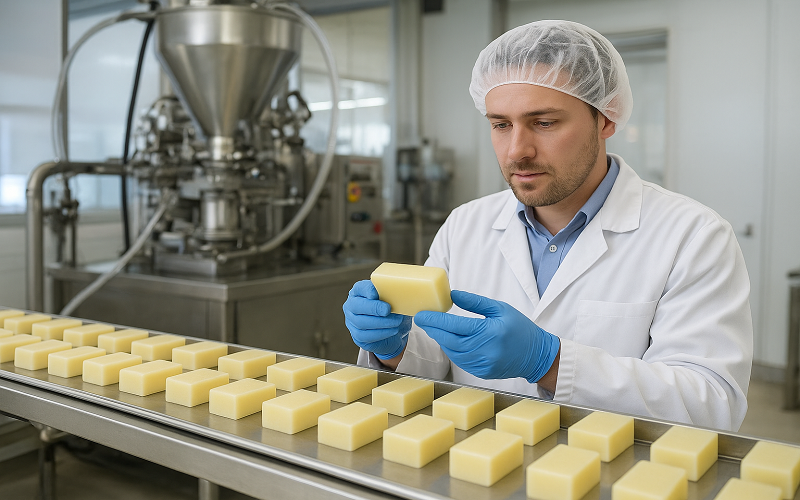Introduction
Gujarat’s soap industry doesn’t look like much from the highway. Most factories hide behind long compound walls, coated in dust from passing trucks. But inside those walls, a very different story unfolds one that has pushed the state ahead of the rest of the country in a field that’s changing faster than most realise. The advantage isn’t just scale. It’s what the state can produce across categories without losing its grip on consistency.
A Manufacturing Culture Built to Take Pressure
The everyday manufacturing rhythm in Gujarat is unusual. Production never seems to slow. Workers move in and out of large sheds, trolleys of materials are pushed along narrow paths, and machines run longer hours than most plants elsewhere manage to sustain. It’s this culture this unspoken toughness that has allowed the state to handle both commodity soap production and premium custom batches under one roof.
Chemical corridors have added another layer of strength. Ankleshwar, Vapi, Dahej, Panoli—each cluster runs like an independent ecosystem with its own supply lines, testing labs, utility systems, and logistics networks. The layout didn’t happen by accident. These corridors were built for faster industrial interaction, and today they serve as the backbone for soap manufacturers in Gujarat, especially those that push out large volume orders for national brands.
The Heavy Groundwork behind Reliable Output
Manufacturers here depend heavily on consistency. Surfactants, natural oils, additives, and essential fragrance compounds flow in through established supply channels. Their arrival isn’t a gamble. That reliability feeds directly into factories, allowing them to experiment without risking delays. When a buyer asks for a modified blend maybe a gentler lather, a fresher scent, or a darker herbal base plants can adjust formulations quickly because they know the inputs won’t dry up.
Where Herbal Knowledge Isn’t Just Marketing
Herbal soaps are a buzzword elsewhere. In Gujarat, they are an inheritance. Many older units still use techniques passed down informally small details about temperature control, ingredient mixing sequences or the way botanical extracts behave under heat.
You will find manufacturers who have been making neem, tulsi and turmeric bars for longer than most personal care brands have existed. Their product lines may have grown, packaging may have changed but the core understanding of natural ingredients hasn’t changed. These factories don’t treat botanicals as add-ons; they treat them as main ingredients that need to be handled with care.
R&D wings have become stronger as herbal demand has gone global. Stability testing for plant based ingredients is a serious job now, especially for units aiming to supply international buyers. That’s where soap manufacturers in Gujarat have quietly built a strong lead: they know how to keep herbal formulations stable across climates without killing their natural properties.
A Surprising Push Toward Luxury and Boutique Soaps
A different energy runs through Gujarat’s newer facilities. Walk into one of the premium manufacturing lines and the first thing you notice is the difference in pace. Workers handle molds gently, fragrances are weighed with precision, and the soap bases look almost artisanal even at industrial scale.
Transparent glycerin bars, goat milk soaps, aromatic blends, cold-processed artisanal lines these aren’t side businesses anymore. They’re full-fledged verticals attracting boutique hotels, spas, wellness labels, and new age D2C brands. The plants that handle this category spend as much time perfecting the feel of the bar as they do on its ingredients.
Customization is endless. Clients come with ideas lavender oat bars, charcoal detox blends, citrus driven hotel soaps and manufacturers turn them into stable products that can be reproduced batch after batch. This is why so many small foreign brands now choose soap manufacturers in Gujarat over distant suppliers they get the quality without the unpredictable timelines.
The Export Engine That Keeps the Sector Moving
A major reason Gujarat stays ahead is export discipline. Plants here pack products with an understanding of how long they’ll sit in containers, how humidity will affect the bars, and what international buyers check for during quality audits.
Factories near the ports operate like extensions of global supply chains. Pallets are wrapped with precision, cartons are labelled cleanly, and quality control slips are attached before transport. For buyers that track their inventory down to the hour, this kind of discipline matters more than branding.
Because the chemical ecosystem around these factories is so tightly linked, raw material shortages almost never slow exports. Plants can run bulk beauty soap lines for domestic markets while producing special edition bars for overseas clients in the same week. That dual capability is rare, and it’s one of the reasons soap manufacturers in Gujarat continue to gain ground internationally.
Why the State Keeps Winning: The Competitive Edge
Look closely at what’s happening on the ground and several patterns explain Gujarat’s dominance:
- Raw Materials within Arm’s Reach
Key inputs surfactants, oils, hardening agents, fragrances are all locally available. Import dependence is minimal, which protects manufacturers during volatile market periods.
- Stronger Compliance Culture
Most factories maintain clear testing protocols because they’ve been exporting for years. Their paperwork, safety controls, and batch records are far more organised than what smaller clusters in other states maintain.
- Ability to Handle Opposite Market Segments
Mass market soaps and luxury bars have completely different production demands. Gujarat handles both without losing balance.
- Private Label Systems That Actually Work
Clients don’t wait endlessly for samples or revisions. Plants have internal teams that can adjust formulas, packaging styles, and textures without dragging the process across months.
Put all of this together and the competitive advantage becomes self-evident: the state has built an industrial machine that can run fast, run wide, and run with precision.
The Obstacles the Industry Still Faces
Not everything runs smoothly. Waste treatment remains a sensitive topic in chemical belts, and soap units tied to larger industrial clusters feel the pressure to stay compliant. Costs of sustainable ingredients are rising. Logistics bottlenecks still appear during peak export seasons.
But these challenges have pushed manufacturers toward cleaner formulations, more efficient mixing systems, and packaging built from recyclable materials. Sustainability is no longer a trend; it’s a requirement. Factories that once used conventional blends are now experimenting with low-impact bases and biodegradable components because global buyers demand it.
What the Future Looks Like for Gujarat’s Soap Sector
If the current momentum continues, Gujarat will end up shaping a major part of India’s personal care output. Herbal makers are refining their craft. Luxury-soap plants are expanding. Medium scale manufacturers are adopting faster R&D cycles that used to be limited to big FMCG firms.
This isn’t just about producing more soaps; it’s about producing differently. With an industrial system capable of handling diversity of formulations, evolving global expectations, and quick customisation demands, soap manufacturers in Gujarat sit at an advantage that most other regions are still trying to build.
The factories may not look glamorous from the outside, but inside those walls, the state is quietly defining how versatile soap manufacturing should look in the next decade.



